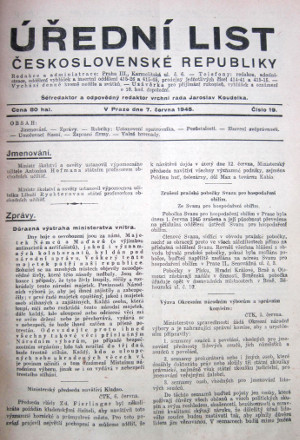After war
Published on 24 March 2015
The issue of material cultural heritage became highly topical after the war, especially after the issuance of Presidential Decree No. 5/1945 Coll., On the invalidity of certain transactions involving property rights from the time of oppression and on the nationalization of the property of Germans, Hungarians, traitors, collaborators and certain organizations and institutions. The decree came into force on 19 May, and, based on it, the first confiscations and nationalization of enemy property took place.
The decree defined “people of German and Hungarian origin, people whose activities were directed against the sovereignty, independence and integrity of the nation, against the democratic-republican state, against the security and defence of the Czechoslovak Republic, and persons who instigated others to such activities or enticed others thereto and who purposely encouraged in any way the German and Hungarian occupiers” as “nationally unreliable”.
The legal norm was born and subsequently it was important to protect such property for the state because, particularly in the borderlands, it fell prey to the local population and to foreign armies. A Secretariat for recording and protecting written, historical, artistic and natural monuments was established, which worked under the cultural department of the Provincial People's Committee. It cooperated with the intellectual elite in the given field – museum curators, librarians, and archivists – people who cooperated in securing this property. The Secretariat proved to be a toothless institution and finished its operation as early as June of the same year. However, besides the Secretariat, there was also the Commission for Securing, which was directly subordinate to the Ministry of Education.
After the liberation, the books we are researching were placed in four North Bohemian castles - Minoň, Houska, Nový Falkenburg and Nový Berštejn. This is why it is important for our research to learn about the context of public administration in the immediate post-war period. This may bring many challenges, because the transfer of state power to the newly established national committees happened at a different pace in various places, and we may assume that even if the whole agenda was documented in writing, only a portion of these records has survived to this day.
The research will continue in the National Archive in the fonds of the Ministery of Education, of Provincial Offices and also on the level of regional archives - the fonds of local and regional national committees, and possibly administration committees. The research in this area is to clarify when and what institutions secured these items.
